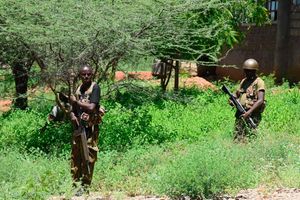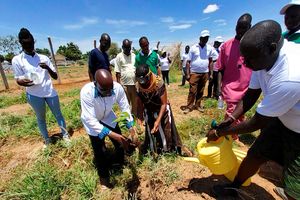
Mogil area in Kerio Valley, Elgeyo Marakwet County in this picture taken on January 03, 2025.
Peace efforts in Kerio Valley have suffered a setback with renewed bandit attacks that have seen at least 10 people killed in the past two months.
The latest incidents include the killing of an Anti-Stock Theft Unit (ASTU) police officer and a chief in separate attacks, dealing a blow to the one-year long multi-agency security operation to crack down on bandits and recover illegal firearms in the region.
The police officer, who was in a contingent of security personnel on a mission to recover stolen animals at Chetulel on the border of Elgeyo Marakwet and West Pokot, was shot dead in a confrontation with suspected bandits.
Elgeyo Marakwet County police boss Peter Mulinge said additional security personnel had been deployed to flush out the bandits.
In another recent incident, armed bandits from Tiaty sub-county attacked the Kapkobil area in Marakwet East and shot dead a herdsman. The gang stole over 70 animals.
“Our security team acted rapidly and managed to recover all the stolen animals, but they are still in pursuit of the bandits who are out to destabilize the prevailing peace in the region,” Mr Mulinge said.
The Kerio Valley straddles the three counties of Elgeyo Marakwet, West Pokot, and Baringo and is home to the Marakwets and Pokots.
It is emerging that the armed criminals have changed tactics, laying ambushes and killing and escaping without stealing any animals.
Among incidents reported last month were of two school-going children who were killed by the marauding criminals and six people who were shot dead in Samburu county in attacks that left scores with injuries.
Further police reports confirmed the killing of four other people, including a National Police Reservist (NPR) in West Pokot County, following retaliatory attacks between the warring Pokot and Marakwet pastoralists, while three people were shot dead in renewed attacks in Baringo County.
“What is happening is that the bandits are now purely on a revenge mission. They shoot to kill, unlike in the past when they would issue early warnings before striking, with livestock theft being their main target,” explained Mr Mulinge.
He said the joint security operation being carried out in Elgeyo Marakwet, West Pokot, and Baringo counties is aimed at restoring law and order in a region that has prolonged retaliatory attacks caused by cattle raids and boundary disputes.
At a meeting with security chiefs from Baringo County two weeks ago, Interior Cabinet Secretary Kipchumba Murkomen attributed the return of bandit attacks in Baringo and Samburu counties to unresolved administrative boundaries and said he is doing his best to restore sanity in the restive North Rift.
His tour came five days after Loruk Location chief, Victor Sebei, 30, was gunned down by armed attackers at Lemuyek, under unclear circumstances.
Following the incident, chiefs in banditry-prone Baringo areas appealed to the government to consider arming them, citing the constant threats on their lives. Concerned chiefs led by Lokis Location Johnston Long’iro said they often put their lives at risk when hunting for well-armed individuals.
They are required to share names of suspected criminals yet threatened by the culprits with dire consequences if they dare report them to authorities for action.
Those working in Baringo North, Baringo South, and Tiaty sub-counties have been on the receiving end, especially when pursuing stolen livestock and tracking down suspected criminals. Some administrators have been attacked by armed raiders and others lost their property while on duty.
“You become a marked man to the bandits who can easily lay an ambush on you while carrying out your normal duties because they know we are not armed. Some of our colleagues have lost their lives after receiving several threats,” said Lokis Location Johnston Long’iro, citing an incident last year when raiders shot at him and other chiefs from Tiaty West while trying to recover 14 cows that had been stolen from Marakwet East.
CS Murkomen said that for the first time, security teams on the ground had arrested a suspect in Baringo County who had been aiding in purchasing stolen livestock.
The Kerio Valley region is occupied by members of the Pokot, Turkana, Marakwet, Tugen, Illchamus and Samburu communities, who have for years, been entangled in protracted armed conflict.
Despite numerous government operations in the region in the past, bandits remain defiant, launching attacks now and then in parts of West Pokot and Elgeyo Marakwet counties and killing people.
Thousands of guns and endless ammunition flow across the Kerio Valley region as the warring pastoral communities launch retaliatory attacks.
The rough geographical terrain has proved a challenge to multi-agency security teams involved in the crackdown of the criminals who take cover in caves in Silale, Nadome, Suguta Marmar and Tiaty hills.
“The attacks are no longer about cattle raids or banditry activities, as the criminals have changed tact and are now targeting businesses and looting property,” said a resident of Embobut, Marakwet East Sub-county, Mr Wilson Kaino.
Among others, the government has set up military camps in the Kerio Valley, created additional administrative units, and purchased modern security equipment in the intensified battle against bandits, with President William Ruto indicating that the multiagency fight against banditry has attained more than 80 percent success and proper measures have been put in place to eradicate the menace to empower the locals to engage in meaningful socio-economic activities.
According to CS Murkomen, Operation Maliza Uhalifu, comprising multi-agency security troops of the Kenya Defence Forces (KDF) and National Police Service launched two years ago has been delivered, and the government was not relenting in tackling the criminals.
Operation Maliza Uhalifu focused on regions declared by the Government as "dangerous and disturbed areas", namely Baringo, Laikipia, Samburu, Turkana, West Pokot, Elgeyo Marakwet, Meru, and Isiolo.
“If anybody thinks we are going to slow down or cede any part of this country to criminals, let them know that we are not going to go back. Our officers are well-trained, facilitated, and resourced to take care of this country, and that is why we are recovering stolen livestock,” the CS said during his recent visit.
“Instead of people celebrating the work that our police officers have done, people are asking why armed criminals are attacking villages- the police are deployed in the affected villages because criminals are likely to come. The officers are there to deal with the criminals should they come. I want to urge police officers to comb the bushes and flush out suspects wreaking havoc,” he added.
He claimed some politicians incited the local communities as the clock started ticking to the next General Election.
“Going forward, we will be targeting individuals who are facilitating and inciting people and engaging in violence. We know the political fever is rising, and politicians will be held accountable for their utterances,” the CS said.
However, the CS observed that most areas affected by insecurity have been marginalized by successive governments and lagging in development, citing poor roads, lack of water, and social amenities.
“It is sad that the suspects wreaking havoc in this region are minors, who are aggressors and victims of marginalization over many years. And as a government, we are determined to ensure we open up this area and end the perennial insecurity menace,” he said.












